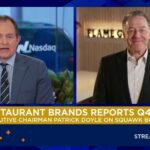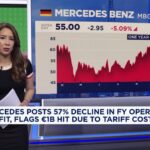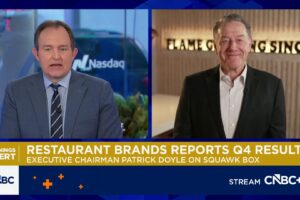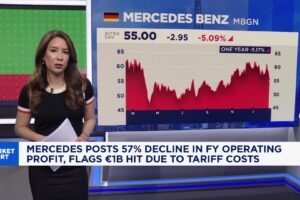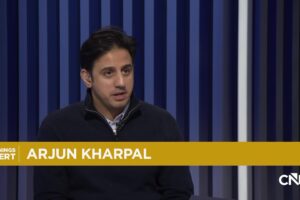The 2024 election and its stakes are on the tip of everyone’s tongue in nearly every area of American life. But not on corporate earnings conference calls.
On call after call throughout October, top executives dodged election-related queries or refused to answer outright — with an intensity that to some observers exceeded past election cycles.
A Yahoo Finance review of major earnings calls from Amazon (AMZN) to Bank of America (BAC) to Microsoft (MSFT) found no mentions the election season. Even companies that have recently found themselves in the political spotlight like McDonald’s (MCD) ignored the topic. Some executives simply shut down conversations when it came up.
When he was asked on one such call with reporters about his conversations with the presidential campaigns and why he won’t publicly endorse a candidate, JPMorgan Chase (JPM) CEO Jamie Dimon responded: “I’m not going to talk about who I’m speaking to,” adding that “I’m not going to get into politics on this particular call.”
The boss of the biggest US bank has been somewhat more willing to weigh into political topics elsewhere, from slamming regulators in a recent speech to speaking regularly to both campaigns and favoring Democratic nominee Kamala Harris in private conversations, according to a source familiar with his thinking.
The authors at The Transcript newsletter on Substack who track comments like this full-time found only a few errant examples of companies gingerly weighing in during this earnings season.
“There’s clearly election anxiety, if you will,” Robert Half International (RHI) vice chairman M. Keith Waddell offered on the call for his HR consulting firm.
CEOs cautious about politics are, of course, nothing new. But this year’s heated contest between former President Donald Trump and Vice President Harris has perhaps made CEOs more wary than at anytime in recent history.
“I think everybody is kind of in a play not to lose situation here from a political standpoint,” noted Scott Krisiloff, The Transcript’s founder and editor, in an interview.
“I think people are being a little more quiet about it just because there is so much visceral emotion,” he added.
Read more: What the 2024 campaign means for your wallet: The Yahoo Finance guide to the presidential election
The CEOs appear to be stepping gingerly in part because of Trump’s history of aggressive tactics with the business community; he has often threatened companies he views as crossing him.
Just the latest example is Deere (DE), with Trump pledging a 200% tariff on “everything that you want to sell into the United States” if the tractor maker moves to Mexico.
And both sides of the divide can extract a price. It’s a lesson Washington Post owner Jeff Bezos and Los Angeles Times owner Patrick Soon-Shiong have learned recently.
After the Bezos-owned Washington Post abruptly shifted and announced it would not endorse any 2024 candidate, more than 250,000 readers canceled their subscriptions, according to NPR. That marks about 10% of the company’s paying subscribers.
Another factor being expressed is whether politics is worth talking about at all.
“I’m tired of hearing this is the biggest election in your lifetime,” BlackRock (BLK) CEO Larry Fink reportedly recently told a conference hosted by the Securities Industry and Financial Markets Association.
“The reality is, over time, it doesn’t matter,” he added.
A similar sentiment was echoed on an earnings call for the W. R. Berkley Corporation (WRB), an insurance company. Rob Berkley, the company’s president and CEO, waded into politics only to note that either candidate could run up more debt.
“If you take each candidate at their word, they are looking to grow the deficit by what would be measured by the trillions of dollars,” he told investors. Whoever wins, he added, it’s inevitable “this country will be growing its deficit, and there is a real question about supply and demand for government debt going forward.”
That sense could be driving an array of these decisions to stay out, according to Krisiloff.
“If you’re not seeing a lot of comments about the election on earnings calls, I think it’s kind of because people have something like Larry Fink’s thing in the back of their mind,” he noted.
Fink himself largely stayed away from the election on his company’s earnings call in October, other than to note that next year after the election in his view “the opportunity for us and our positioning for us is fantastic.”
That comes after years where Fink often weighed in on politics to the point where his annual letters to investors often focused on things like environment, social, and governance (ESG) principles in investing.
Fink now refuses to say ESG at all and says the term has become “weaponized.”
One CEO who did lightly touch on the 2024 race on his earnings call was Derek Schmidt, the CEO of Flexsteel Industries (FLXS), who listed “uncertainty over the US Presidential election” as one of the headwinds his firm continues to face.
Krisiloff also offered a reminder that CEOs at the end of the day are likely just like everyone else and probably are following the final week of the race closely even if they are aren’t inclined to discuss it publicly.
“Everybody’s paying attention to it, even if they’re pretending not to,” he said.
David Hollerith contributed reporting. Ben Werschkul is Washington correspondent for Yahoo Finance.
Every Friday, Yahoo Finance’s Rachelle Akuffo, Rick Newman, and Ben Werschkul bring you a unique look at how U.S. policy and government affects your bottom line on Capitol Gains. Watch or listen to Capitol Gains on Apple Podcasts, Spotify, or wherever you find your favorite podcasts.
Read the latest financial and business news from Yahoo Finance


